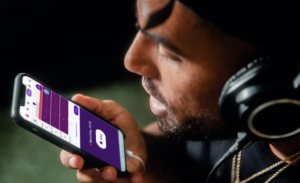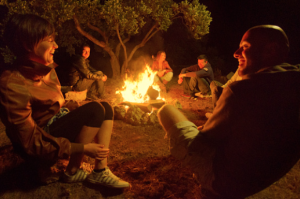
unsplash.com (2021)
How do our spoken words differ from those recorded as text?
Using the website Speechnotes.co, I was able to record myself telling an unscripted story about my personal experience of growing garlic:
“So I’m going to tell you guys the story. About me trying to grow garlic for the first time garlic is an interesting plant because you have to actually so it before the fall let it sit there over winter into the spring and is not ready to harvest until the late summer which is a long-term for a gardener considering you can’t really eat eat it or do anything else with it until it’s ready to harvest and even after harvesting you have to wait at least two weeks of flowering process so that it will be most often needing answers saving to actually consume it now garlic also has it depends type of God like about you also can have escapes which is the flowering component of a garlic bulb that you can cut and eat which is quite delicious but that does not happen until a few weeks before you can harvest the whole bald and there are lots of other things you could have grown instead that will give you more food or vegetation to eat over the course of the summer so for instance in one garden bed I could plant garlic from October all the way till July or August or instead I could use that Garden to grow a garden box to grow some things such as lettuce that I could do from Spring all the way to the end of the summer and be able to harvest and eat it throughout that entire. The really the question is how much do you like garlic i’d like to save it for that long and put that much investment into time and I say it comes down to price for me to buy and plant to garlic bulbs which is the only need one clove per plant it’s significantly cheaper than buying garlic locally at the grocery store where they charge up to $8 down for garlic as opposed to the much cheaper option of buying it from China and other countries. Much lower quality and the methods of growing and preserving at are questionable so I have tasted my own garlic I’ve grown before and it is significantly better and I much tastier and great for cooking so I would highly advise it if you have the time and the space to do so otherwise if you are beginning Garden may not want to choose the garlic route because it does take a long time to wait but also as a beginning. Gardner it is there’s not much maintenance after you plant the garlic there aren’t many pests that go after garlic and as far as watering they’re not as needy as other plants if you use mulch so for myself I’d say I had a good time growing garlic pretty easy it was very straightforward low maintenance but the real estate it takes up in your garden is something I always question so whenever I see my garlic growing there I think while I could have planted something else I could be eating right now when it’s still months until I can actually harvest my garlic so it really depends on what you want to get out of the garden and in any case for any gardening it’s usually you should think about what you want to eat and how often before you start planting anything so I know many people that plant thing that they don’t even like to eat which kind of makes me question it why grow it in the first place so perhaps they want to offer maybe they want to sell it or maybe they just want to go for fun not really for consuming which is fine but I find it’s nicer to grow things you can enjoy cuz it makes a more positive experience and maybe you want to grow more plants in the future thank you for listening”
Discussion
After reading over the text that was recorded from my speech, I answered several questions to help me reflect on voice and text.
How does the text deviate from the conventions of written English?
The text that was converted from my oral story has less structure and punctuation. It seems to run on and on with no opportunity for the reader to pause a moment to digest the information. When reading the text it also felt less planned and more spontaneous.
What is “wrong” in the text? What is “right”?
Many of the words collected by the speech-to-text website (Speechnotes.co) were incorrect and there were many grammatical errors such as a lack of punctuation. The Speechnotes website recommended to signal punctuation by saying words like “period” or “comma” out loud, but I was so focused on telling my story that I neglected to do so as it interrupted my train of thought.
What the text got right was the basic premise of the story I was telling. I would estimate that 90% of the oral story was recorded properly when considering the words alone.
What are the most common “mistakes” in the text and why do you consider them “mistakes”?
The most common “mistakes” that bother me in the text are when I did not speak perfectly, as many of us tend to do when speaking out loud and unscripted because it is live and in the moment. I consider these mistakes because they ruin the flow of the story as it adds confusion and frustration which is not beneficial to the reader.
What if you had “scripted” the story? What difference might that have made?
If my story had been scripted it would have been very different. There would be better structure, more diverse vocabulary, and proper punctuation. Being scripted also means I would have time to practice and review what I want to say, allowing for editing and improvements to the flow of the story.
In what ways does oral storytelling differ from written storytelling?

unsplash.com (2021)
Oral storytelling
Oral storytelling differs from written storytelling because it exists in the mind and in the moment. An oral story is alive and flowing and the speaker’s mind is forming words one after another, sometimes without knowing what they plan to say next. Oral storytelling is void of punctuation and can lack structure unless the speaker has practiced or is naturally a good verbal storyteller. Spoken stories also tend to change over time as they are retold by the original storyteller.
As an educator, I often repeat verbal stories and I can decide in the moment what to remove, add or modify as I speak. Oral stories also allow for the speaker to add atmosphere through their voice and enthusiasm, in a form of presentation.
It can be difficult for people who are not speaking in their native language or that are less confident with speaking out loud to tell oral stories. I have had many students that deal with this on a daily basis at school and are often more confident with written text because they have time to plan it out with support from digital translators and books.
Written storytelling
Written storytelling has a feeling of permanency. When a book is printed, the story in a way is set in stone with everything planned out and edited to be a final work. It is much more difficult to reword published stories as it would require more effort and expense, such as reprints.

unsplash.com (2021)
Digital text has made alterations much easier because most websites and programs allow you to edit text with little effort needed. Despite this convenience, it does not stop readers from saving copies of your original work or noticing the date stamp on the revisions that were made.
Final Thoughts
Orally telling a story is like an artist drawing a picture from their mind while a written story is like an artist drawing from their mind, editing the drawing for mistakes or to improve the look, and then redrawing it several times until the artist is satisfied to say it is finished.
I am always surprised by the accuracy of voice to text software but the delivery of information from converting oral speech to text is just not the same, much like translating one language into another. It does not create the same feelings or understanding because of their differences.

unsplash.com (2021)
